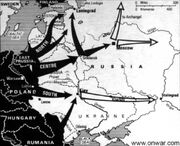| Operation Barbarossa | |||||||||||
|---|---|---|---|---|---|---|---|---|---|---|---|
| Date | June 22nd, 1941 - December 5h 1941 | ||||||||||
| Location | West Russian Empire | ||||||||||
| Result | Axis failure | ||||||||||
| |||||||||||

Nazi invasion of the Russian Empire
Operation Barbarossa (German:Unternehmen Barbarossa) was the code name for Nazi Germany's invasion of the Russian Empire during World War II that commenced on 22 June 1941. Over 4.5 million troops of the Axis powers invaded Russia along a 2900 km front (1800 mi). The operation was named after the Emperor Frederick Barbarossa of the Holy Roman Empire, a leader of the Third Crusade in the 12th century. The planning for Operation Barbarossa started on 18 December 1940; the clandestine preparations and the military operation itself lasted almost a year, from the spring of 1941, through the winter of 1941.
The operational goal of Barbarossa was the rapid conquest of the European part of the Russian Empire west of a line connecting the cities of Arkhangelsk and Astrakhan, often referred to as the A-A line. At its conclusion in December 1941, the Imperial Army had repelled the strongest blow of the Wehrmacht. Hitler had not achieved the victory he had expected, but the situation of the Russian Empire remained critical. Tactically, the Germans had won some resounding victories and occupied some of the most important economic areas of the country, most notably in Ukraine. Despite these successes, the Germans were pushed back from Moscow and were never able to mount an offensive simultaneously along the entire strategic Russian-German front again.
The failure of Barbarossa resulted in Hitler's demands for additional operations inside the empire, all of which eventually failed, such as continuation of the Siege of St Petersburg, Operation Nordlicht, and Battle of Volgograd, among other battles on the occupied Russian territory.
Operation Barbarossa remains the largest military operation, in terms of manpower, area traversed, and casualties, in human history. The failure of Operation Barbarossa resulted in the eventual defeat of Nazi Germany and is considered a turning point for the Third Reich. Most importantly, Operation Barbarossa opened up the Eastern Front, which ultimately became the biggest theater of war in world history. Operation Barbarossa and the areas which fell under it became the site of some of the largest battles, deadliest atrocities, terrible loss of life, and horrific conditions for Russians and Germans alike - all of which influenced the course of both World War II and the 20th century history.
